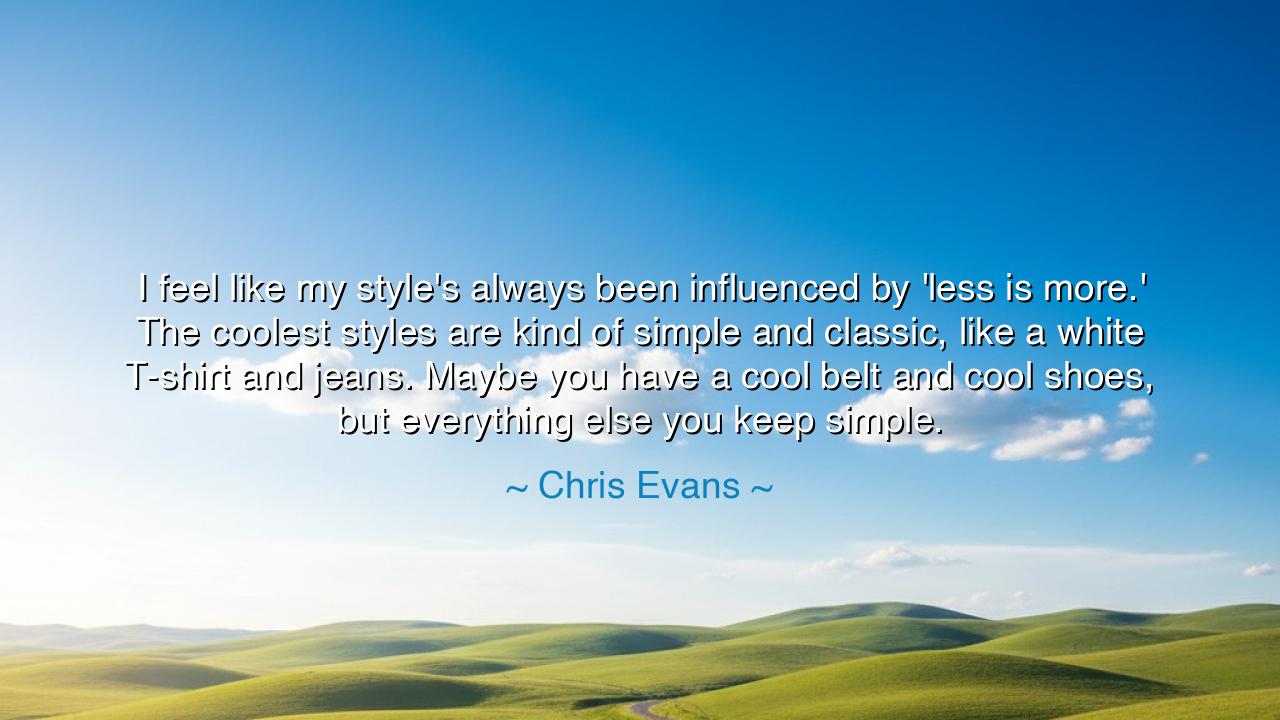
I feel like my style's always been influenced by 'less is more.'
I feel like my style's always been influenced by 'less is more.' The coolest styles are kind of simple and classic, like a white T-shirt and jeans. Maybe you have a cool belt and cool shoes, but everything else you keep simple.






"I feel like my style's always been influenced by 'less is more.' The coolest styles are kind of simple and classic, like a white T-shirt and jeans. Maybe you have a cool belt and cool shoes, but everything else you keep simple." These words from Chris Evans reflect a profound understanding of simplicity, elegance, and the timeless power of understated style. In a world often overwhelmed by excess—whether in fashion, possessions, or even ideas—Evans’ embrace of the philosophy of "less is more" offers a refreshing return to clarity and focus. His preference for simplicity suggests that true style is not about gaudy displays or unnecessary complexity, but about embracing what is essential and finding beauty in the classic and timeless.
The ancient philosophers also embraced the idea of simplicity, finding wisdom in the minimal and the natural. Socrates, for example, believed that true happiness came from inner peace and virtue, not from the external trappings of wealth or luxury. In his lifestyle, Socrates embodied the ideal of simplicity, rejecting material excess and focusing on the cultivation of character. His belief that one should seek only what is necessary to live a virtuous life parallels Evans' notion of style—not weighed down by excess but instead refined and intentional. For Socrates, as for Evans, greatness is found in purity and honesty, not in complexity or adornment.
Similarly, the Stoics, like Marcus Aurelius, practiced austerity as a path to inner strength. In his Meditations, Aurelius often reflects on the power of simplicity and restraint in life, advising that one should seek not luxury, but virtue in its simplest form. For the Stoics, simplicity was not just an aesthetic choice but a way of life—one that allowed the individual to focus on what truly matters: wisdom, justice, self-discipline, and courage. Aurelius understood that, just like in Evans’ vision of style, it is the essence that counts. Extravagance only detracts from the clarity needed to pursue a meaningful life.
The lessons of simplicity in both ancient Greece and Rome resonate through history. One of the most iconic examples is Leonardo da Vinci, whose genius in art and science was marked by his minimalistic approach. His art, like his life, emphasized clarity over complexity. In his famous painting, the Mona Lisa, da Vinci used minimal brushstrokes to capture the most profound depth of expression, revealing that simplicity can lead to the most profound beauty. Like Evans, da Vinci knew that the power of simplicity lies in its ability to focus attention on what is most important, whether in fashion or in art.
Similarly, Coco Chanel, a trailblazer in the world of fashion, revolutionized the industry by introducing simple, elegant designs. Chanel famously said, "Simplicity is the keynote of all true elegance." She rejected the ornate, complicated fashions of the 19th century in favor of the clean lines and functional simplicity that have come to define her timeless style. Just as Chanel’s influence reshaped the world of fashion, Chris Evans' words serve as a reminder that true style does not lie in over-decoration but in the confidence to wear what is comfortable, classic, and honest.
The lesson here is a powerful one: greatness—whether in style, character, or life—is found in simplicity. Evans, like the great philosophers and artists of the past, recognizes that true elegance lies not in complexity, but in the careful curation of the essentials. In our own lives, we often seek to add more—to accumulate more possessions, more responsibilities, more opinions. Yet, the ancients teach us that what we need most is often already within us, and by stripping away the unnecessary, we can reveal our true selves. This principle applies not only to fashion but to how we live our lives: focus on what is essential, shed the excess, and you will find a clearer, more fulfilling path.
In our own lives, we can adopt Evans’ philosophy of simplicity by taking time to reflect on what truly matters to us and letting go of distractions. Whether it’s in our personal style, our relationships, or our work, we should focus on the core values and essentials that bring meaning to our lives. By choosing to live with intention, we create space for what is truly important—just as Chris Evans has found in his wardrobe and the Stoics found in their lives. Simplicity is not about deprivation but about elevating what truly matters, allowing us to live with clarity and purpose.






AAdministratorAdministrator
Welcome, honored guests. Please leave a comment, we will respond soon